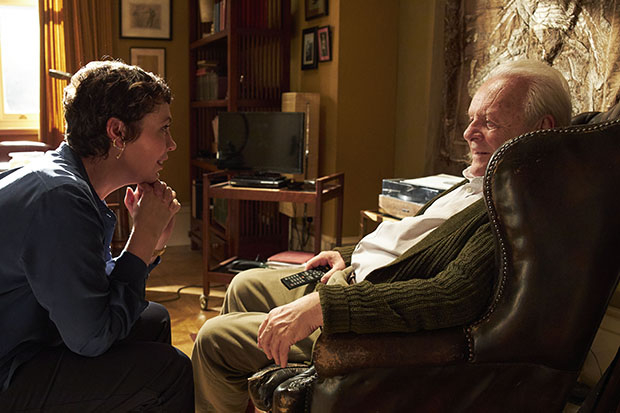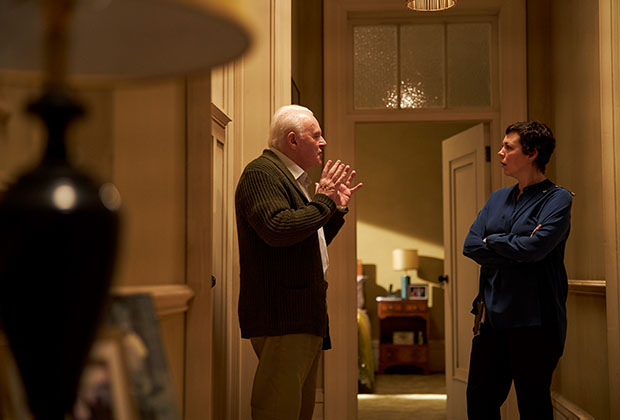Review: Anthony Hopkins Plays a Patriarch in Decline in The Father

(© Sean Gleason)
It must have seemed like a fresh concept back when Florian Zeller's play The Father hit Broadway in 2016, in a Manhattan Theatre Club production that earned Frank Langella a Tony Award. Instead of simply observing the effects of an elderly man's dementia on the world around him, Zeller went a step further and turned the main character's headspace into a puzzle box, blurring fantasy and reality in ways that theoretically hewed to the manner in which dementia patients process the world around them. However, in subsequent plays — The Mother and The Height of the Storm have been produced in New York since then — Zeller has applied a similarly gimmicky approach to mental illness to diminishing returns.
Now, Zeller has brought The Father to the screen in an adaptation he directed and co-wrote with Christopher Hampton, starring Anthony Hopkins and Olivia Colman. It's one thing for Zeller to attempt this kind of narrative game-playing onstage, where arguably his only peer in that regard is Harold Pinter. By bringing his vision to the cinematic medium, however, he is now competing with the likes of legendary French filmmaker Alain Resnais and, more recently, Christopher Nolan when it comes to exploring the outer limits of perception and reality through temporal instability and scrambled chronologies. One look at, say, Resnais's still-challenging landmark 1959 romance Hiroshima Mon Amour, and Zeller's idea of structural provocation can't help but seem too literal-minded by comparison.
The patriarch of the title is André (Hopkins), and over the course of the film, we gradually get a sense that his mind is deteriorating. He keeps losing his keys and accusing nurses of stealing them. He claims he was a tap dancer in his younger days, while his long-suffering daughter Anne (Colman) states for the record that he was an engineer. He frequently brings up another daughter, Elise, never seen, wondering why she doesn't visit him anymore. He often misidentifies people, places, and things. All of this is revealed in the manner of a mystery, with each scene providing new clues into the reality of André's situation — an unexpected object here, a tossed-off line of dialogue there — until the final scene strips all the illusions away and lays everything bare.

(© Sean Gleason)
As involving as it may be in the moment to piece this psychological puzzle together, there's something overly tidy about the way Zeller lays out these crumbs, to the point where the cleverness of Zeller's writing threatens to overwhelm the emotions it's meant to evoke. It doesn't help that we ultimately don't get a particularly deep impression of these people. At times, one gets the sense that André may have been difficult to deal with even before dementia set in, especially when he outright states his preference of the aforementioned absent daughter Elise over Anne. Otherwise, though, rarely does he come off as anything other than an object of pity. Anne isn't given much dimension either. She's just another planet orbiting André's solar system of mental decline and medical need.
It's a good thing that Zeller has not only attracted great actors to handle his material, but that he has directed them well enough to allow pathos to shine through even amid his showiest narrative tricks. Colman gives full weight to Anne's ambivalent feelings, torn between devotion to her father and a desire to live her own life. Rufus Sewell manages a similarly tricky balancing act as Anne's boyfriend, Paul, struggling to tamp down the frustration he feels at the familial situation he's been thrust into. (If anything, Zeller has made Paul more sympathetic in the film than he was in the play.) By comparison, Imogen Poots, as prospective new nurse Laura, exudes the patience of a saint in André's alternately charming and ornery presence, as does Olivia Williams as a mysterious woman, with Mark Gatiss coming off as Williams's smarmy opposite as a mysterious man.
Naturally, though, this is Anthony Hopkins's show. Whereas Frank Langella was lordly as André, Hopkins is subtle, with a refined authority, befitting the camera's intensified intimacy. As a result, his occasional blank expressions — captured in painful close-ups by cinematographer Ben Smithard — have the power to break your heart, as does a climactic moment when he seems to revert to a childlike state. Even at Zeller's most structurally precious, Hopkins's performance explodes onscreen with the power of grim, unsparing truth.










